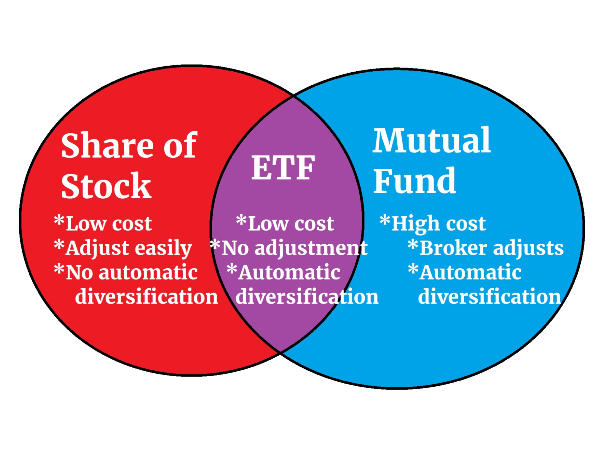Once you have decided to put your money into investing rather than savings, you will discover a wide range of options: bonds, cryptocurrency, stocks, mutual funds, ETFs, IRAs, and more! Sometimes, the multitude of options can scare people away from investing...but it shouldn't! Knowing the investing vocabulary will empower you and put you on the road to building wealth.
Shares of Stock
Most people have heard of stock, which are units of ownership in a corporation. When you buy a share of stock, you can make profit in two ways: Selling the share of stock itself when its value rises, and receiving dividends on a regular basis. Dividends are your share of the corporation's profit, and you receive dividend payments based on the number of shares you own. It is public record (so you can Internet search) what the quarterly dividend of a corporation is. For example, Ford Motor Company is paying 10 cents per share in quarterly dividends. If you own 10 shares of Ford, you will receive $1.00 every three months.
Reinvesting Dividends
Obviously, $1.00 in dividend payments every three months is not putting you on the road to riches! However, most investors compound their stock ownership, similar to compound interest in banking, by choosing to reinvest their dividends. On your stock app, or through a brokerage firm, you can simply click to have your dividends reinvested, meaning they automatically purchase more shares of that investment. So, instead of getting a small check or deposit every quarter (3-month period), you purchase more stock. At first, this will only buy fractional shares, but eventually it will compound to buying multiple additional shares every quarter!
Mutual Funds
Many investors like to select individual stocks and build their own portfolio of stocks. However, some investors prefer to invest in a professionally-selected portfolio of stocks and other investments. A portfolio of investments managed by a professional, into which customers invest a select dollar amount, is a mutual fund. These funds are offered by most major brokerage firms like Charles Schwab and Fidelity.
One advantage of mutual funds is that they often provide automatic diversification, meaning less risk of loss due to an individual company or industry facing losses. A second advantage is that professional stockbrokers are likely to pick high-quality, profitable investments to put in those portfolios. Third, there are many mutual fund options based on your goals: Rapid growth, high dividends per share, stability, long-term growth, etc.
A disadvantage of mutual funds can be associated fees, so make sure you do your research before picking a mutual fund! The cost of managing mutual funds typically means that fund profits are reduced slightly, as the brokerage firm must take a small percentage of profits to pay overhead costs and to make trades. A second disadvantage, especially for beginning investors, is that most mutual funds require a minimum investment amount, often $500 or more. Additional investments into the fund must be made in similar increments, so small payments of $20 or $50 will not be possible.
Exchange Traded Funds (ETFs)
A "hybrid" investment between individual shares of stock and mutual funds are ETFs, or exchange traded funds. ETFs are index funds that are meant to mirror a larger portfolio of investments. Popular ETFs are those that mirror the performance of the two most basic stock market performance indexes: The Dow Jones Industrial Average and the S&P 500. When people say that the "stock market" is up or down, they are typically referring to these two measurements (rather than all 3,000+ stocks on the New York Stock Exchange!).
Instead of having to buy a share of all 30 stocks in the Dow Jones, or all the stocks in the S&P 500, you can simply buy one share of a Dow Jones ETF. These ETFs are available on investing apps and through brokerage firms, and allow investors to enjoy portfolio diversification without having to meet a high minimum investment. However, ETFs are passively managed funds, so they will not be adjusted to "beat" the market.













Once you have decided to put your money into investing rather than savings, you will discover a wide range of options: bonds, cryptocurrency, stocks, mutual funds, ETFs, IRAs, and more! Sometimes, the multitude of options can scare people away from investing...but it shouldn't! Knowing the investing vocabulary will empower you and put you on the road to building wealth.
Shares of Stock
Most people have heard of stock, which are units of ownership in a corporation. When you buy a share of stock, you can make profit in two ways: Selling the share of stock itself when its value rises, and receiving dividends on a regular basis. Dividends are your share of the corporation's profit, and you receive dividend payments based on the number of shares you own. It is public record (so you can Internet search) what the quarterly dividend of a corporation is. For example, Ford Motor Company is paying 10 cents per share in quarterly dividends. If you own 10 shares of Ford, you will receive $1.00 every three months.
Reinvesting Dividends
Obviously, $1.00 in dividend payments every three months is not putting you on the road to riches! However, most investors compound their stock ownership, similar to compound interest in banking, by choosing to reinvest their dividends. On your stock app, or through a brokerage firm, you can simply click to have your dividends reinvested, meaning they automatically purchase more shares of that investment. So, instead of getting a small check or deposit every quarter (3-month period), you purchase more stock. At first, this will only buy fractional shares, but eventually it will compound to buying multiple additional shares every quarter!
Mutual Funds
Many investors like to select individual stocks and build their own portfolio of stocks. However, some investors prefer to invest in a professionally-selected portfolio of stocks and other investments. A portfolio of investments managed by a professional, into which customers invest a select dollar amount, is a mutual fund. These funds are offered by most major brokerage firms like Charles Schwab and Fidelity.
One advantage of mutual funds is that they often provide automatic diversification, meaning less risk of loss due to an individual company or industry facing losses. A second advantage is that professional stockbrokers are likely to pick high-quality, profitable investments to put in those portfolios. Third, there are many mutual fund options based on your goals: Rapid growth, high dividends per share, stability, long-term growth, etc.
A disadvantage of mutual funds can be associated fees, so make sure you do your research before picking a mutual fund! The cost of managing mutual funds typically means that fund profits are reduced slightly, as the brokerage firm must take a small percentage of profits to pay overhead costs and to make trades. A second disadvantage, especially for beginning investors, is that most mutual funds require a minimum investment amount, often $500 or more. Additional investments into the fund must be made in similar increments, so small payments of $20 or $50 will not be possible.
Exchange Traded Funds (ETFs)
A "hybrid" investment between individual shares of stock and mutual funds are ETFs, or exchange traded funds. ETFs are index funds that are meant to mirror a larger portfolio of investments. Popular ETFs are those that mirror the performance of the two most basic stock market performance indexes: The Dow Jones Industrial Average and the S&P 500. When people say that the "stock market" is up or down, they are typically referring to these two measurements (rather than all 3,000+ stocks on the New York Stock Exchange!).
Instead of having to buy a share of all 30 stocks in the Dow Jones, or all the stocks in the S&P 500, you can simply buy one share of a Dow Jones ETF. These ETFs are available on investing apps and through brokerage firms, and allow investors to enjoy portfolio diversification without having to meet a high minimum investment. However, ETFs are passively managed funds, so they will not be adjusted to "beat" the market.